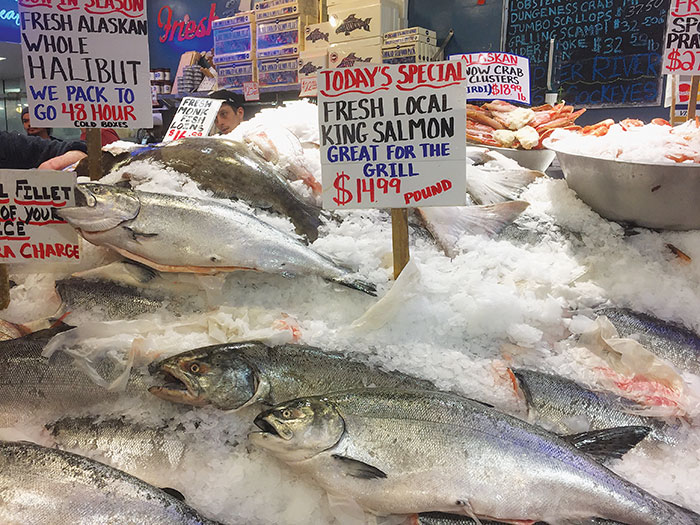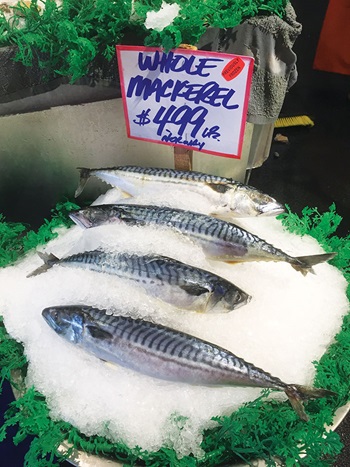Long-term business models are helping to drive change in the global fisheries sector
By Catherine Norwood
 Pike Place Market, Seattle
Pike Place Market, SeattlePhotos: Catherine Norwood
Traceability emerged as a leading criterion for the seafood industry during the 2017 SeaWeb Seafood Summit held in the US, as discussions in the sector evolve beyond the environment sustainability and certification issues that have previously dominated discussions.
The summit, held in Seattle, Washington, attracted 560 attendees from 36 countries to discuss the future of seafood production and markets. Business interests representing all parts of the global supply chain were represented by delegates and speakers, who mixed with representatives from environmental and philanthropy non-government organisations (NGOs), governments and research agencies.
 Whole Mackerel at Pike Place Market, Seattle.
Whole Mackerel at Pike Place Market, Seattle.The summit was a great opportunity to discover what is happening in the seafood industry around the world and the large number of Australian attendees showed the strong engagement of Australia’s seafood sector.
Far from the adversarial and conflict-driven approaches that have typified discussions between fishery stakeholders in the past, the 2017 SeaWeb Summit demonstrated the evolution of a more international collaborative approach.
The opening keynote speaker was Kathleen McLaughlin, senior vice-president and chief sustainability officer for the world’s largest grocer, Walmart.
Her role with the company, she said, was to work on initiatives that enhanced the sustainability of the business for the categories they sold and to strengthen communities where the business operates, and from where it sourced products. “And seafood is a big part of that,” she said.
Seafood was one of 20 commodities Walmart had pledged to buy from certified sustainable sources by 2025, she said. However, it had realised it needed to provide “a ladder to sustainability” for fisheries that could not yet meet certification criteria.
To achieve this, Walmart has participated in six formally agreed upon and audited Fishery Improvement Projects (FIPs), which provide systematic improvement in fishery and aquaculture operations.
Looking ahead, Kathleen McLaughlin nominated overfishing, illegal, unregulated and unreported (IUU) fishing, the interdependency of social and environmental systems and food security as major threats to the future of sustainable seafood.
It was incumbent on Walmart to address these threats, she said, which would in turn help its efforts to responsibly source seafood, verifying the origin of seafood from the source through to finished product, and conditions under which it was harvested or produced. This included both environmental and human conditions.
Ocean workplace
The need to ensure safe workplaces and unforced labour has come to the fore with recent media reports of human trafficking and slavery on fishing vessels.
NGOs and philanthropic organisations were strongly represented at the conference in sessions about possible action on better labour practices, particularly on board vessels in developing nations, and identifying illegal practices.
These included a presentation from NGO Oceana on its investigations into trans-shipping – the exchange of supplies, crew and cargo at sea. The practice has the potential to disguise illegally caught fish with legal catch, and to prevent crew members from disembarking.
Data systems
Supply chain speakers included Thomas Kraft of Norpac Fisheries Export. For more than a decade his focus has been on developing electronic traceability to track product from the vessels of the company’s fishing partners to the consumer, tracking pathways across the globe. He also spoke of improving the speed and efficiency of the company’s buying, processing and distribution systems. He said these efficiencies often paid for themselves.
Thomas Kraft’s presentation echoed the broader conference discussions around data tracking and digital systems, with multiple perspectives provided about data collection and use, including collaborations with “fishers as researchers” to help monitor and determine the sustainability of fish stocks.
Sessions on marketing and seafood sales identified the lack, even in the US, of a united platform for seafood promotion. New marketing research presented found that consumer confidence in labelling that demonstrated traceability fed into higher consumer confidence for other claims such as sustainability.
The 2018 SeaWeb Seafood Summit will be held in Barcelona, Spain, from 19 to 21 June.





